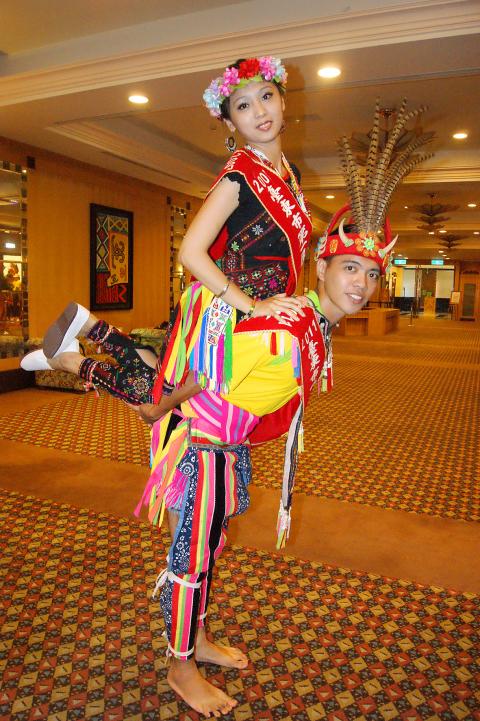In many fairy tales, a handsome prince and a beautiful princess fall in love, get married and live happily ever after. For Taiwanese Aborigines, the romantic love between a warrior and a tribal princess can also be the basis of a romantic story, although it comes with a little extra effort.
Chen Chin-yu (陳靳豫) and Lai Chien-yi (賴謙誼) met each other when they took part in the “Aboriginal Ambassador Princess and Warrior Competition,” an annual event organized by the Taitung City Government which started in 2007.
After entering the competition, Chen, an Amis Aborigne, began to date Lai, a woman from the Paiwan people, and their relationship blossomed sufficiently for the young couple to decide to marry.

Photo: Huang Ming-tang, Taipei Times
After registering their marriage at the local district office, they officially became husband and wife, at least in the eyes of the law.
Keen to follow traditional Paiwan customs, Chen has to wait until March next year before going to Lai’s house and taking her away as his wife. This is because Lai is a Paiwan princess and her family has ruling royal status in the local community. For a man to marry a Paiwan princess he has to carry her away on his back, and so must have the physical strength and stamina to manage the task.
Lai’s home is on Chinchen Mountain (金針山) in Taitung County’s Taimali Township (太麻里).
When he visits next year, Chen must carry Lai from her home and down the mountain for 3km to a ceremonial wedding site at Dawang Elementary School.
“According to Paiwan tradition, the groom must carry the bride on his back from her parents’ house to the site of the wedding ceremony,” Lai said.
“The groom must place both of his hands behind his back so the bride can kneel on his palms while being carried. This is the traditional way to do it,” she added.
“From my home to Dawang school is about 3km and is downhill all the way. As it is easier to carry someone uphill than downhill, it is a real challenge for my husband,” she said. “However, it should not be too hard for him because he serves in the military and is used to heavy physical exercise.”
Chen, who is enrolled in the air force’s officer training program, said: “We perform routine physical workouts everyday and I’m getting good training for my strength and stamina. If I keep this up until next year, I should be able to successfully complete my most important mission — to carry my wife to our wedding.”

The first global hotel Keys Selection by the Michelin Guide includes four hotels in Taiwan, Michelin announced yesterday. All four received the “Michelin One Key,” indicating guests are to experience a “very special stay” at any of the locations as the establishments are “a true gem with personality. Service always goes the extra mile, and the hotel provides much more than others in its price range.” Of the four hotels, three are located in Taipei and one in Taichung. In Taipei, the One Key accolades were awarded to the Capella Taipei, Kimpton Da An Taipei and Mandarin Oriental Taipei. Capella Taipei was described by

The Taichung District Court yesterday confirmed its final ruling that the marriage between teenage heir Lai (賴) and a man surnamed Hsia (夏) was legally invalid, preventing Hsia from inheriting Lai’s NT$500 million (US$16.37 million) estate. The court confirmed that Hsia chose not to appeal the civil judgement after the court handed down its ruling in June, making the decision final. In the June ruling, the court said that Lai, 18, and Hsia, 26, showed “no mutual admiration before the marriage” and that their interactions were “distant and unfamiliar.” The judge concluded that the couple lacked the “true intention of

EVA Airways today confirmed the death of a flight attendant on Saturday upon their return to Taiwan and said an internal investigation has been launched, as criticism mounted over a social media post accusing the airline of failing to offer sufficient employee protections. According to the post, the flight attendant complained of feeling sick on board a flight, but was unable to take sick leave or access medical care. The crew member allegedly did not receive assistance from the chief purser, who failed to heed their requests for medical attention or call an ambulance once the flight landed, the post said. As sick

INDUSTRY: Beijing’s latest export measures go beyond targeting the US and would likely affect any country that uses Chinese rare earths or related tech, an academic said Taiwanese industries could face significant disruption from China’s newly tightened export controls on rare earth elements, as much of Taiwan’s supply indirectly depends on Chinese materials processed in Japan, a local expert said yesterday. Kristy Hsu (徐遵慈), director of the Taiwan ASEAN Studies Center at the Chung-Hua Institution for Economic Research, said that China’s latest export measures go far beyond targeting the US and would likely affect any country that uses Chinese rare earths or related technologies. With Japan and Southeast Asian countries among those expected to be hit, Taiwan could feel the impact through its reliance on Japanese-made semi-finished products and